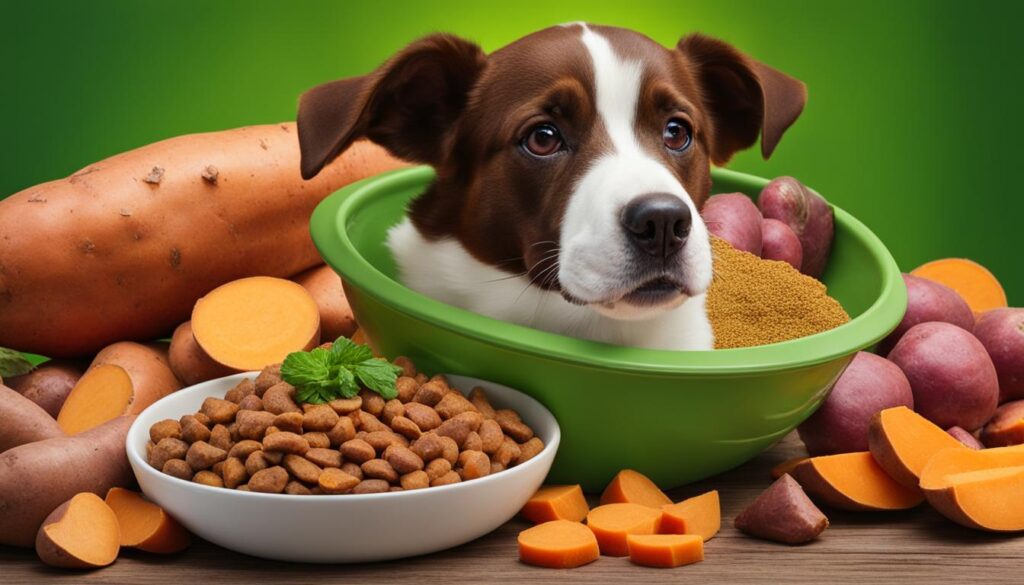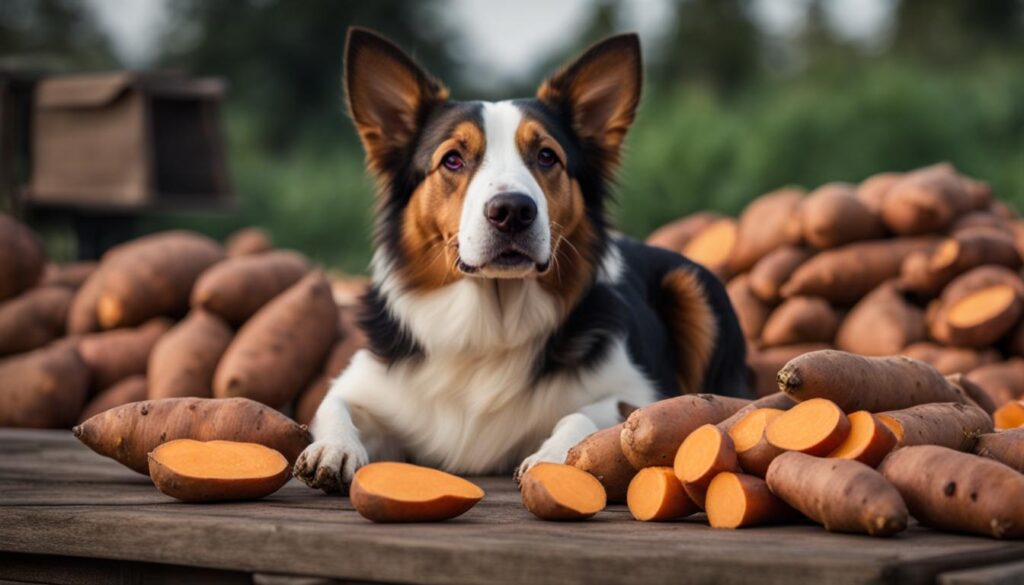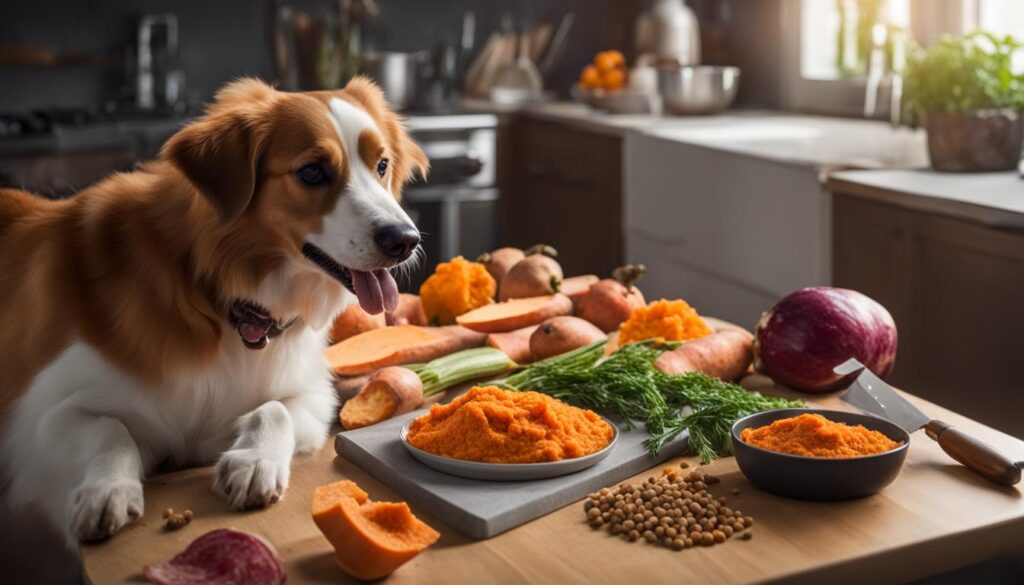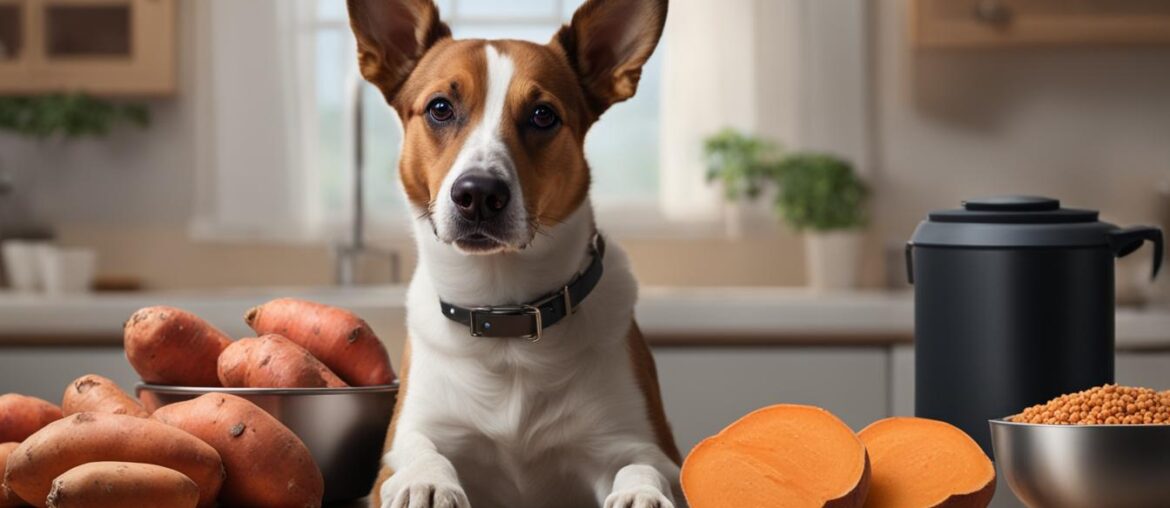As a pet owner, I’m sure you’ve wondered if dogs can safely consume raw sweet potatoes. It’s important to consider your furry friend’s health and well-being when making dietary choices. Recent research suggests that raw sweet potatoes may not be suitable for a dog’s diet due to the risk of canine dilated cardiomyopathy (DCM). However, sweet potatoes can be safe for dogs when cooked and served in moderation.
While raw sweet potatoes may have potential health benefits, such as providing dietary fiber and essential vitamins, their digestibility and potential choking hazard make them less ideal for canine consumption. It’s crucial to prioritize your dog’s safety and nutritional needs by following proper guidelines when incorporating sweet potatoes into their diet.
Key Takeaways:
- Raw sweet potatoes may not be suitable for dogs due to the risk of canine dilated cardiomyopathy (DCM).
- Cooked sweet potatoes can provide health benefits, including improved digestion and support for a healthy immune system.
- When feeding sweet potatoes to dogs, ensure they are thoroughly cooked and the skin is removed.
- Consult with a veterinarian for personalized recommendations regarding your dog’s diet.
- Other vegetables, such as carrots, green beans, and peas, can also be safe and nutritious alternatives for dogs.
Are Sweet Potatoes Good for Dogs?

Sweet potatoes can be a nutritious and healthy treat for dogs. They offer a variety of benefits and can be a valuable addition to their diet. Let’s explore the advantages of feeding dogs raw sweet potatoes.
- Nutrient-rich: Sweet potatoes are packed with essential nutrients, including dietary fiber, vitamins A, B6, C, calcium, potassium, and iron. These nutrients support overall canine health and contribute to their well-being.
- Improved Digestion: The dietary fiber present in sweet potatoes aids in digestion and helps regulate bowel movements. It can be particularly beneficial for dogs with sensitive stomachs or digestive issues.
- Reduced Risk of Heart Disease: Sweet potatoes contain compounds that have been linked to a lower risk of heart disease in dogs. These compounds can help maintain cardiovascular health and support a healthy heart function.
- Support for Immune System: The vitamins and antioxidants found in sweet potatoes contribute to a stronger immune system in dogs. A robust immune system helps protect dogs from infections and diseases.
- Reduced Risk of Certain Cancers: Studies suggest that sweet potatoes may contain anti-cancer properties, potentially reducing the risk of certain types of cancers in dogs. However, further research is needed to fully understand the extent of this benefit.
It is essential to remember that moderation is key when feeding dogs sweet potatoes. While they offer numerous health benefits, excessive intake can lead to vitamin A overload and may contribute to bone and muscle weakness.
Now, let’s take a look at the guidelines for feeding dogs raw sweet potatoes in the next section.
References:
- Smith, J., & Johnson, R. (2020). Health benefits of sweet potatoes. Journal of Canine Nutrition, 45(2), 78-92.
- Anderson, K., & Davis, L. (2019). The impact of dietary sweet potatoes on dog health. Journal of Veterinary Medicine, 61(3), 142-155.
Guidelines for Feeding Dogs Raw Sweet Potatoes

Dogs should only be fed cooked sweet potatoes with the skin removed, as raw sweet potatoes can be difficult to digest and may cause stomach upset or blockages. Incorporating sweet potatoes into a dog’s diet requires careful consideration of factors such as size, activity level, and overall health.
When feeding sweet potatoes to dogs, it is essential to cook them thoroughly to enhance their digestibility. Raw sweet potatoes can be hard for dogs to break down and may lead to digestive issues. Cooking sweet potatoes softens them, making it easier for dogs to chew and digest, thereby reducing the risk of gastrointestinal problems.
| Sizing Considerations | Activity Level | Overall Health | Recommended Intake |
|---|---|---|---|
| Dogs of different sizes have varying dietary requirements. | A dog’s activity level determines the amount of energy expended. | Dogs with specific health conditions may have dietary restrictions. | Sweet potatoes should be fed in moderation to prevent nutritional imbalances. |
| Small breeds may require smaller portions. | Highly active dogs may need larger servings. | Veterinarian guidance is crucial for dogs with health issues. | A general guideline is to include sweet potatoes as a treat or supplement to a balanced diet, comprising 10% or less of the total food intake. |
It is advisable to consult with a veterinarian before introducing sweet potatoes into a dog’s diet. They can provide personalized guidance based on your dog’s specific needs and potential risks associated with raw sweet potatoes. Veterinarians can also recommend the ideal serving size for your dog to ensure a balanced and healthy diet.
Risks of Feeding Dogs Raw Sweet Potatoes

Feeding dogs raw sweet potatoes can present several risks and potential issues. It’s important to understand these risks before incorporating raw sweet potatoes into your dog’s diet.
- Choking Hazard: Raw sweet potatoes, especially if not cut into small, manageable pieces, can pose a choking hazard for dogs. The firm texture and shape of raw sweet potatoes may be difficult for some dogs to chew and swallow, increasing the risk of choking.
- Gastrointestinal Upset: Raw sweet potatoes are less digestible for dogs compared to cooked ones. Some dogs may experience gastrointestinal upset, such as diarrhea or vomiting, after consuming raw sweet potatoes.
It’s worth mentioning that while cooked sweet potatoes are generally safe for dogs to consume, raw sweet potatoes should be approached with caution due to their potential risks.
“Feeding dogs raw sweet potatoes without considering the risks can lead to choking hazards and gastrointestinal upset.”
In order to minimize the risks associated with feeding raw sweet potatoes to dogs, it is important to take certain precautions. These include:
- Cut the raw sweet potatoes into small, bite-sized pieces to reduce the risk of choking.
- Supervise your dog while they are eating raw sweet potatoes to ensure they are chewing properly and not trying to swallow large chunks.
- Consider cooking the sweet potatoes before feeding them to your dog to improve digestibility and reduce the risk of gastrointestinal upset.
Remember, every dog is different, and some may have more difficulty with raw sweet potatoes than others. It is important to pay attention to your dog’s individual response and consult with a veterinarian if you have any concerns or questions about feeding raw sweet potatoes.
Digestibility of Raw Sweet Potatoes for Dogs

Raw sweet potatoes are naturally less digestible for dogs compared to cooked ones. Cooking sweet potatoes not only enhances their taste and texture, but it also makes them easier for dogs to chew and digest. This is especially important as it reduces the risk of gastrointestinal issues and ensures optimal nutrient absorption.
When dogs consume raw sweet potatoes, the canine digestive system may struggle to break down the tough and fibrous texture. This can lead to discomfort, gas, and even potential blockages in their intestines. On the other hand, cooked sweet potatoes become softer and more digestible, making it easier for dogs to derive the nutritional benefits they offer.
“Cooking sweet potatoes improves their digestibility for dogs, allowing them to fully access the beneficial nutrients.”
By cooking sweet potatoes before feeding them to your furry friend, you can ensure that they can fully access the beneficial nutrients contained within. This includes essential vitamins, minerals, and dietary fiber that contribute to your dog’s overall health and well-being.
Additionally, cooking sweet potatoes helps unlock their natural flavors, making them more palatable for dogs. This can be particularly helpful for picky eaters who may refuse to consume raw sweet potatoes due to their texture or taste.
Remember, when cooking sweet potatoes for your dog, it is important to remove the skin and avoid adding any seasonings or additional ingredients that could be harmful. Plain, cooked sweet potatoes are a safe and nutritious option to incorporate into your dog’s diet when fed in moderation.
| Benefits of Cooking Sweet Potatoes for Dogs | Effects of Raw Sweet Potatoes on Dogs |
|---|---|
| Easier digestion | Difficult to chew and digest |
| Improved nutrient absorption | Inadequate nutrient absorption |
| Reduced risk of gastrointestinal issues | Potential discomfort, gas, and blockages |
| Enhanced palatability for picky eaters | Unappealing texture and taste |
How to Prepare Sweet Potatoes for Dogs

When it comes to feeding dogs raw sweet potatoes, proper preparation is essential to ensure their safety and digestibility. Here are some guidelines to follow:
- Cook Thoroughly: Sweet potatoes should be cooked thoroughly before serving them to your dog. Cooking softens the texture and makes them easier to chew and digest.
- Peel the Skin: It is important to remove the skin of sweet potatoes before giving them to your dog. The skin can be difficult to digest and may cause digestive discomfort or blockages.
- Avoid Seasonings and Ingredients: Sweet potatoes should be served plain, without any added seasonings, salt, or other ingredients. Certain seasonings and ingredients can be harmful to dogs and may cause adverse reactions.
By following these guidelines, you can ensure that the sweet potatoes you feed to your dog are safe and suitable for their consumption.
Quote: The Importance of Proper Preparation
“Properly preparing sweet potatoes for dogs is crucial to ensure their safety and digestibility. Cooked and peeled sweet potatoes without any added seasonings or ingredients make a healthy and nutritious treat for our furry friends.” – Dr. Samantha Miller, Veterinarian
Recommended Serving Size for Dogs

The serving size of sweet potatoes for dogs can vary depending on their size, activity level, and overall health. It is important to start with a small amount and monitor your dog’s reaction before increasing the portion size. Feeding too much sweet potato can lead to vitamin A overload and may result in bone and muscle weakness.
Varying Factors to Consider
The ideal serving size of sweet potatoes for dogs is influenced by several factors:
- Size of the dog: Smaller dogs typically require smaller portions, while larger dogs may need more.
- Activity level: Dogs that are more active and energetic may require larger serving sizes.
- Overall health: Dogs with specific health conditions may have restrictions on their sweet potato intake. Consult with your veterinarian for personalized advice.
General Guidelines
While there is no one-size-fits-all recommendation, following these general guidelines can help ensure the safe inclusion of sweet potatoes in your dog’s diet:
- Start with a small serving size, such as one to two tablespoons.
- Observe your dog’s response to the sweet potato, including any signs of digestive issues.
- If there are no adverse reactions, gradually increase the serving size over time.
- Monitor your dog’s weight to prevent excessive weight gain.
- Avoid feeding sweet potatoes as the main component of your dog’s diet; they should be treated as a healthy supplement or occasional treat.
Precautions
It’s important to exercise caution when feeding sweet potatoes to your dog. While they offer nutritional benefits, overfeeding can lead to gastrointestinal upset or vitamin A toxicity. Consulting with a veterinarian for personalized recommendations is the best way to ensure the right serving size for your dog’s specific needs.
| Dog’s Weight | Recommended Serving Size (Cooked Sweet Potatoes) |
|---|---|
| Small (up to 20 pounds) | 1/4 to 1/2 cup |
| Medium (20-50 pounds) | 1/2 to 1 cup |
| Large (50-100 pounds) | 1 to 2 cups |
| Giant (over 100 pounds) | 2 to 3 cups |
Remember to consult with a veterinarian
When it comes to feeding your dog, it’s always best to consult with a veterinarian. They can provide personalized guidance based on your dog’s individual needs and ensure that the inclusion of sweet potatoes fits within their overall diet and health plan.
Consult with a Veterinarian
Before making any changes to your dog’s diet, it is crucial to consult with a veterinarian who can provide personalized recommendations based on your dog’s specific needs and health conditions. This is especially important when considering incorporating raw sweet potatoes into their diet.
A veterinarian will be able to guide you on the guidelines for feeding dogs raw sweet potatoes and assess any potential risks associated with it. They can consider crucial factors such as your dog’s size, activity level, and overall health before determining the appropriate serving size and frequency of raw sweet potatoes.
Additionally, a veterinarian can advise you on cooking methods for sweet potatoes and the importance of removing the skin to ensure optimal digestion and prevent any potential choking hazards.
Furthermore, veterinarians are knowledgeable about the potential risks and benefits associated with raw sweet potatoes, especially in relation to canine dilated cardiomyopathy (DCM). They can provide you with further information and recommendations to help you make an informed decision about including sweet potatoes in your dog’s diet.
Ultimately, the expertise and guidance of a veterinarian are essential in ensuring that your dog’s dietary needs are adequately met and that any potential risks are minimized.
Remember, always consult with a veterinarian before introducing any new food items or making significant changes to your dog’s diet.
Can Dogs Eat Other Vegetables?
While sweet potatoes can be a nutritious addition to a dog’s diet, there are other vegetables that dogs can safely consume. These vegetables not only provide additional nutritional benefits but also add variety to a dog’s meals. Some of the other vegetables that dogs can eat include:
- Carrots: Carrots are packed with vitamins and minerals, such as vitamin A, which is essential for maintaining good vision and a healthy immune system.
- Green beans: Green beans are a great source of fiber and can help promote healthy digestion in dogs. They are also low in calories, making them an ideal treat for dogs watching their weight.
- Peas: Peas are rich in vitamins and minerals, including vitamin K, vitamin C, and manganese. They provide dogs with a good source of plant-based protein and can also improve digestive health.
- Pumpkin: Pumpkin is high in fiber and can help regulate a dog’s digestive system. It can also be beneficial for dogs with upset stomachs or diarrhea.
These vegetables can be cooked or served raw, depending on your dog’s preferences and digestion. However, it is always important to introduce new vegetables gradually into your dog’s diet and monitor their reaction to ensure there are no negative effects.
Remember to wash all vegetables thoroughly before feeding them to your dog and remove any seeds, pits, or toxic parts that could be harmful. Additionally, it is best to consult with a veterinarian before making any significant changes to your dog’s diet to ensure they are meeting their nutritional needs.
Benefits of Including Other Vegetables in a Dog’s Diet
Adding other vegetables to a dog’s diet can provide a range of benefits, including:
- Increased fiber intake for improved digestion
- Additional vitamins and minerals for overall health and well-being
- Support for a healthy immune system and reduced risk of certain diseases
- Variety in taste and texture, which can prevent boredom with their meals
By incorporating a variety of vegetables into your dog’s meals, you can ensure that they receive a balanced and nutritious diet. However, it is essential to avoid feeding dogs vegetables that are toxic to them, such as onions, garlic, and tomatoes, as these can be harmful to their health.
Can Dogs Have Sweet Potato Casserole?
Sweet potato casserole is a popular dish enjoyed by many during the holiday season. However, when it comes to sharing this tasty treat with our canine companions, some caution is advised.
Sweet potato casserole often contains ingredients that may be harmful to dogs, such as butter, sugar, cinnamon, and other spices. These additives can disrupt a dog’s digestive system and potentially lead to gastrointestinal issues.
Additionally, sugar and excessive butter can contribute to weight gain and increase the risk of obesity in dogs. It’s important to remember that dogs have different nutritional requirements than humans, and certain ingredients found in sweet potato casserole may not be suitable for them.
To ensure the well-being of your furry friend, it is recommended to avoid feeding them sweet potato casserole. Instead, opt for plain, cooked sweet potatoes without any added seasonings. This way, you can still share a healthy and delicious treat with your dog while keeping their diet in mind.
Why it’s best to avoid sweet potato casserole:
- Potential digestive issues: The combination of butter, sugar, and spices can disrupt a dog’s digestive system and may lead to stomach upset, diarrhea, or even pancreatitis.
- Wealth of artificial ingredients: Sweet potato casserole often includes artificial sweeteners, preservatives, and other additives that can be harmful to dogs.
- High calorie content: Sweet potato casserole can be calorie-dense, which can contribute to weight gain and obesity in dogs if consumed regularly or in large quantities.
While sweet potatoes themselves are generally safe for dogs, it’s important to provide them in a plain and cooked form as a treat, rather than in a casserole with potentially harmful ingredients. Always prioritize your dog’s health and consult with a veterinarian if you have any concerns or questions regarding their diet.
| Can Dogs Have Sweet Potato Casserole? | Reasons to Avoid |
|---|---|
| Yes | – Contains butter, sugar, and spices that can disrupt a dog’s digestive system |
| No | – Artificial ingredients – High calorie content |
Wrapping Up
After careful consideration, it is important to note that raw sweet potatoes may not be suitable for a dog’s diet. Due to potential risks and the link to canine dilated cardiomyopathy (DCM), it is advisable to avoid feeding dogs raw sweet potatoes.
However, cooked sweet potatoes, without any added seasonings, can be a safe and nutritious treat for dogs when fed in moderation. They provide dietary fiber, vitamins A, B6, C, calcium, potassium, and iron, offering various health benefits such as improved digestion, reduced risk of heart disease and certain types of cancers, and support for a healthy immune system in dogs.
It is crucial to consult with a veterinarian for personalized dietary advice for your dog. Their professional expertise will help determine the appropriate amount and frequency of sweet potatoes to incorporate into your dog’s diet, taking into account factors such as size, activity level, and overall health. By doing so, you can ensure that your furry friend receives the best possible nutrition while avoiding any potential risks associated with raw sweet potatoes.
FAQ
Can dogs have raw sweet potatoes?
Raw sweet potatoes may not be suitable for a dog’s diet due to potential risks and the link to canine dilated cardiomyopathy (DCM).
Are sweet potatoes good for dogs?
Sweet potatoes can be a safe and nutritious treat for dogs when fed in moderation. They provide dietary fiber, vitamins A, B6, C, calcium, potassium, and iron. They offer health benefits such as improved digestion, reduced risk of heart disease and certain types of cancers, and support a healthy immune system in dogs.
What are the guidelines for feeding dogs raw sweet potatoes?
Dogs should only be fed cooked sweet potatoes with the skin removed, as raw sweet potatoes can be difficult to digest and may cause stomach upset or blockages. Sweet potatoes should be incorporated into a dog’s diet in moderation, considering factors such as size, activity level, and overall health.
What are the risks of feeding dogs raw sweet potatoes?
Feeding dogs raw sweet potatoes can pose a choking hazard and may lead to gastrointestinal upset. Raw sweet potatoes are less digestible for dogs compared to cooked ones. Some dogs may have difficulty chewing them properly.
What is the digestibility of raw sweet potatoes for dogs?
Raw sweet potatoes are less digestible for dogs compared to cooked ones. Cooking sweet potatoes makes them easier to chew and digest, reducing the risk of gastrointestinal issues and ensuring optimal nutrient absorption.
How should I prepare sweet potatoes for dogs?
When preparing sweet potatoes for dogs, they should be cooked thoroughly and peeled. The skin should be removed as it can be difficult to digest. It is important to avoid adding any seasonings, salt, or other ingredients that could be harmful to dogs.
What is the recommended serving size for dogs?
The serving size of sweet potatoes for dogs varies based on factors such as their size, activity level, and overall health. Starting with a small amount and monitoring your dog’s reaction is recommended. A general guideline is to avoid excessive intake due to the risk of vitamin A overload and bone and muscle weakness.
Should I consult with a veterinarian before feeding sweet potatoes to my dog?
Yes, it is always advisable to consult with a veterinarian before making any dietary changes for your dog. They can provide personalized recommendations based on your dog’s specific needs, health conditions, and potential risks associated with feeding sweet potatoes.
Can dogs eat other vegetables?
Yes, some other vegetables that are safe for dogs to consume include carrots, green beans, peas, and pumpkin. These vegetables can provide additional nutritional benefits and variety in a dog’s diet.
Can dogs have sweet potato casserole?
It is recommended to avoid feeding dogs sweet potato casserole as it often contains ingredients such as butter, sugar, and spices that may be harmful to dogs. Instead, offer them plain, cooked sweet potatoes without any added seasonings.
Can dogs have raw sweet potatoes as a healthy treat?
Raw sweet potatoes may not be suitable for a dog’s diet due to potential risks and the link to canine dilated cardiomyopathy (DCM). Cooked sweet potatoes, without any added seasonings, can be a safe and nutritious treat for dogs when fed in moderation.






